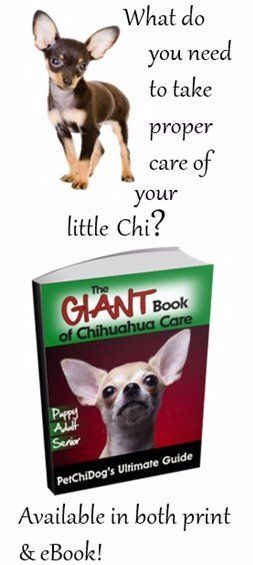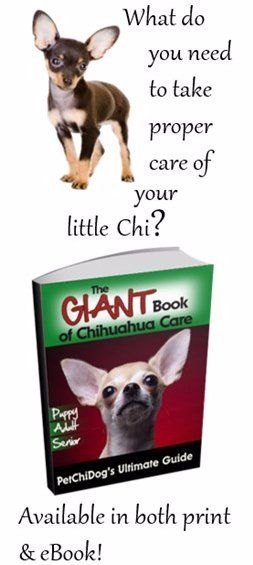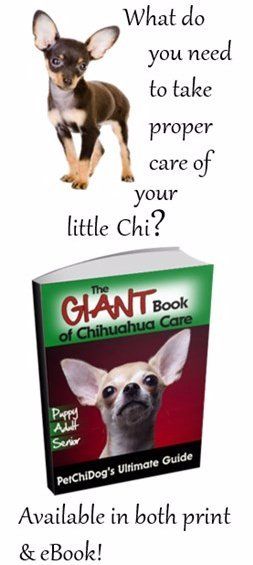Teething
Chihuahua Teething
Chihuahua Teething Age
At about the age of 4 to 6 months, puppies will begin to lose their ''baby teeth'' and their permanent, adult canine teeth begin to grow in.
This process most often happens in a very specific order:
First the smaller front teeth come out, then the premolars, molars and finally the canine teeth will be the last to fall out.
For most puppies, the teeth fall out one by one and this may happen while your pup is eating or playing, so they are often swallowed and you may not notice that it has happened.
If at the age of 6 months, if your Chihuahua puppy
is still holding onto his puppy teeth, you should have a veterinarian perform a dental checkup.
In rare cases, an adult dog tooth will come in slanted and may affect the other teeth.
The loss of puppy teeth and the growth of adult teeth normally happen in this order:
• 4 Months old - the incisors begin to grow in
• 5 months old - the canine teeth begin to grow in
• 6 months old - the molars begin to grow in
By 8 months old, a Chihuahua puppy should have all teeth ascended and stop teething.
Do keep in mind that some are late bloomers and teething may last a bit longer.
When an Adult Tooth Grows in Before a Puppy Tooth Falls Out
Sometimes, an adult tooth will begin to drop down while the puppy tooth is still in place. A puppy may then have double row of teeth. This can happen with 1 tooth or with several. You will want to address this right away.
With the puppy tooth in the way, the adult tooth may grow in crooked. This can cause:
• Discomfort
• Cuts to the inside of the mouth
• Eating and chewing problems
Therefore, if this situation happens, you will want the veterinarian to take a look to see if steps should be taken to more things along. Most likely, the tooth can be pulled out without sedation. Doing so, will allow the adult tooth to grow in properly and you will have an adult with proper alignment.
Chihuahua Teething Discomfort
When a puppy is teething, they have a strong, uncontrollable urge to chew on anything and everything. They may seem to go crazy trying to find something to satisfy! This is one reason why an owner must puppy-proof the home, to keep any dangerous items away from the reach of the puppy, such as electrical cords.
Your puppy will not understand the difference between chewing on your favorite shoes and chewing on a teething toy. All the puppy knows is that chewing makes him feel better and helps to relieve the discomfort that his erupting teeth are causing.
There are several things that you can do to get through this phase without your puppy chewing up the house and actually helping your puppy:
1. The Proper Type of Teething toys.
This is a must. A teething toy is much different than a regular dog toy. To truly relieve itching and discomfort, it must satisfy several different elements:
A:
It must be durable enough to stand up to the sharp teeth of the Chihuahua puppy.
B:
It should be hold the attention of the puppy; after all if the chew doesn't seem interesting it will be of little value.
C: Some will be shaped with small, safe protrusions. These smaller parts of the toy help tremendously with teething.
A puppy is able to manipulate the tiny projections into hard-to-reach areas of the mouth and gums to hit "just the right spot”.
D:
Some of the best ones will be designed to be frozen. When a puppy is teething, having a cold toy to chew on offers a lot of relief.
Many teething toys actually hold water. When you freeze them, a puppy will chew on them for hours as the frozen ice turns into a cold slush.
After an hour or so, you can offer another frozen toy that is waiting in your freezer.
2. Ice cubes.
This will not only entertain you, but will help make your Chihuahua puppy feel better. Most puppies find it amazingly fun to chase an ice cube around on a slippery floor, such as one made of linoleum or hardwood.
The ice cube’s cold temperature will offer relief to the puppy’s gums. You can freeze plain water or you can add a safe flavoring. Some of the safe ingredients that you can add are: Apple juice and cranberry juice.
3. Feed frozen foods.
Frozen and indigestible treats will be beneficial as it helps with both swelling and discomfort.
Some frozen foods that a Chihuahua puppy can safely eat (within reason) are: Frozen yogurt (regular, not low fat or low sugar) and frozen baby food (be sure that it does not contain onion powder. Place dollops of it in mini cupcake trays then place in the freezer).
4. Consider the main meal.
Dry kibble may help a bit by scratching at those sore gums though for some puppies with very sore gums, dry food may actually irritate things.
We also strongly recommend home cooking as it is the best way to ensure that your Chihuahua has real, fresh, healthy food with zero additives, preservatives, artificial coloring and/or fillers.
If you wish to stay with manufactured meals, we suggest adding a warm, low-sodium chicken or beef broth, in order to make for a more "soupy" consistency that will be much easier on the teeth and the gums.
Other Issues that Can Occur Due to Teething
During this phase, you may notice other things happening with your little guy or girl... that at first may seem completely unrelated to teething.
You may notice that just 1 of these things are happening to your pup...Or all of them. Each Chi is very different in regard to growth and how the body reacts to the major changes that occur during the teething process. So, let's look at some elements that may occur and what you can do:
1. Ears may be affected.
Ears that used to stand erect may:
- Droop down very low
- One may droop and one may stand
- One or both may roll back toward the backside of the head
- An ear may droop or roll one day...And the next day it may be the other ear that is out of place
Do know that this is not uncommon. While it will not happen to all Chihuahuas that are teething, it is not out of the ordinary. With just about all Chi, ears will go back to what is "normal" for the puppy once the teething stage is done....It even may only last during a particular week or 2 during this time.
Those that have weak ears to begin with will be more prone to this. There is no reason to tape them or make any attempt to fix this issue as it should clear up on its own. In very few cases, if the supporting muscles are weak, this is usually a case of an inherited trait and the puppy would not have clearly erect ears in any case.
See Also:
Floppy Ears
2. Testicles may be affected with males.
If this happens, you may notice that:
- One has seemed to disappear
- Both have seemed to disappear
What to do? We highly recommend to NOT palpate them in an attempt to make them drop...Doing so can cause injury. There are a couple of elements to this issue.
1st, with many Chihuahua puppies, it is not uncommon for them to not drop until all the way up to the age of 6 months.
2nd, this is most often a temporary side effect of teething and they will drop just about the time that teething is done. If you see that 1 or both have not dropped by the age of 8 months, it will be time to have the veterinarian take a look.
Other Reasons for Chewing
Most chewing problems stem from 1 of 4 causes:
- Teething
- Curiosity
- Boredom
- Nervousness
We already discussed teething issues, so let's talk more about the other 3 reasons that a puppy may chew:
Curiosity
Chewing or gnawing on objects is one method that dogs use to explore their world. With some many sensory receptors in his mouth, a Chihuahua can find out a lot more about an object by chewing on it as opposed to touching it with his paw. Therefore it is instinct for a dog to bite down or mouth something that they want to learn about.
You can cut down on the damage done to your home by removing floor-level objects and by having a large supply of fun and interesting dog toys. Additionally there are products, safe to dogs, that can be sprayed onto certain things (sofa, etc.) that will keep a dog away.
Boredom
Boredom can wreak havoc. Chihuahuas need stimulation throughout the day. If left alone, they will explore, and chew, on anything that they can reach.
Here are some tips to relieve boredom:
1) Rotate toys so that every other week or so, the puppy has a 'new' set to choose from
2) Exercise your dog twice per day (short 15 minute walks for puppies and longer 20 to 30 minute walks for adults). This satisfies a dog's urge to explore and use his senses, which can create a calmer dog when back in the house.
3)
Set aside time to interact with your Chihuahua; often just 'being there' is not enough. This breed is famously clingy and even 20 minutes per day of playing a game or command training can be helpful. Dogs will often keep themselves occupied if they know that personal one-on-one time is going to happen on a regular basis.
Nervousness
The Chihuahua breed can also be a nervous dog. If your dog seems to be chewing out of anxiety, take a moment to really look at the environment of your home.
Is loud music always blaring? Do people have a tendency to talk very loudly? Are people coming and going constantly? Do your best to provide a calming house and if you really cannot control the noise or traffic level, offer your Chihuahua a safe haven.
An area in a quiet room with a crate or dog bed would be best. Your dog should have a place to retreat, to quietly play with toys when feeling overwhelmed.
We are a participant in the Amazon Services LLC Associates Program, an affiliate advertising program designed to provide a means for us to earn fees by linking to Amazon.com and affiliated sites.
Email: Contact@PetChiDog.com



